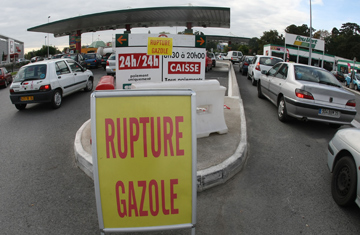
A sign reads "Out of Fuel" at a gas station in Rennes, western France, on Oct. 18, 2010
Which side will blink first? That's the most urgent question facing French politicians as the country drags into its sixth week of mammoth strikes and demonstrations in protest against President Nicolas Sarkozy's proposal to raise the minimum retirement age from 60 to 62, and the age for receiving full pension benefits from 65 to 67. On Tuesday, French officials delayed a crucial Senate vote for final approval of the reform from Wednesday to later in the week. Sarkozy again insisted that he would not back down from his plan, telling reporters that raising the retirement age is "essential." "France is putting retirement reform into effect, like our German friends did," he said, appearing with German Chancellor Angela Merkel and Russian President Dmitri Medvedev in the seaside resort of Deauville, where the three met to discuss security cooperation and financial regulation. "Confrontation is never a positive thing."
Yet along with the street confrontations, France now faces a problem that could cause far greater economic pain than the protests: a growing shortage of fuel. All of France's 12 oil refineries have been shut by strikers for the past week, while workers have halted operations at the country's major oil terminal of Fos-Lavera, outside Marseilles, for three weeks, leaving more than 30 ships stranded offshore, ending almost all of France's oil imports and helping to push oil futures in New York above $83 a barrel this week. French officials said on Monday that about 1,000 gas stations across France had run out of fuel and that about 15% of them had shut altogether. Facing widening fuel shortages, the government triggered the release of the country's emergency oil reserves on Monday. And on Wednesday, authorities forced strike-shuttered fuel depots to reopen to ensure that supplies could be made available, using security forces to lift blockades by strikers at three fuel depots serving the west of the country.
Ironically, the strikes have been a boon for refineries elsewhere in Europe, which had cut production during the recession, thanks to a drop in demand. Now, without France's fuel exports, those refineries have ramped up in recent days. "No other E.U. country is facing shortages," says Aad Van Bohemen, head of the International Energy Agency's emergency-policy division. "They are increasing production in their refineries."
But the effort by French officials to stabilize fuel supplies has been thwarted by a growing anxiety among the French that the strikes could drag on for weeks. Increasingly uneasy about the upheaval on the streets, drivers have rushed to fill their tanks. Long before dawn in Paris on Oct. 19, lines formed outside fuel stations whose pumps were open, in a hunt for diesel fuel, which powers about three-quarters of France's cars. By mid-afternoon, French television was reporting four-hour waits in some areas for diesel. Prime Minister François Fillon said on Tuesday that the government would begin trying to distribute fuel to those gas stations that have run dry. But there are other problems. Strikers have blockaded about 20 of France's 219 fuel terminals, trying to stop the emergency reserves from reaching gas stations. Once the trucks leave the terminals, officials say, it could still be several days before gas stations resume normal operations, since transportation and other strikes have tangled each step of the distribution process. "We have considerable bottlenecks," Jean-Louis Schilansky, president of the French Oil Association, said on the France24 television channel that evening, adding that the only French fuel strikes in recent history of this magnitude were in 1995 and in 1968, the year French students sparked a massive revolt, forever changing France. "This is a very, very exceptional circumstance," he said.
About half of France's trains ground to a halt on Tuesday, and about one-third of flights in and out of Paris were grounded. Garbage piled up in areas where refuse workers were on strike. In Paris, hundreds of thousands of protesters blocked traffic for their sixth mammoth march since early September. And overnight on Monday, riot police in bullet-proof vests and helmets fought running battles with rock-throwing youth in a suburb of Paris. Even electricity has been short this week, as France electricity workers went on strike, forcing the government to import electricity on Monday and Tuesday to prevent blackouts.
Since late last week, the union protests have been bolstered by thousands of students, some as young as 13, who have seized the occasion to vent their fury at a range of Sarkozy policies. In the République district of Paris on Oct. 16, tens of thousands of students joined a march against the pension reform, chanting, "There is money in the coffers of the bosses."
That slogan sums up the argument that many protesters shared with TIME: the government is demanding financial concessions from those who can least afford to make them, even while major French corporations are doing well. Several protesters said they realized that generous state benefits like free education and health care — and the lowest retirement age among Western countries — are a huge financial burden on the debt-ridden government but added that they resent their benefits being curtailed while there are signs of great wealth around them. "Why don't they, for example, tax advertising 1% and create a huge fund for retirement?" says Marie-Jeanne Charrier, 27, who works at a public-housing project. "Of course we know we have to change something. The government has a huge debt. But the poor always lose out on these reforms."
Despite weeks of disarray, support for the protests is holding, in part because they have tapped into a deep well of frustration with Sarkozy's presidency. An opinion poll published on Monday by the paper Le Parisien showed that about 71% of French people support or feel sympathetic toward the protests. With the wind on their backs, the strikers, for now, are not blinking.
